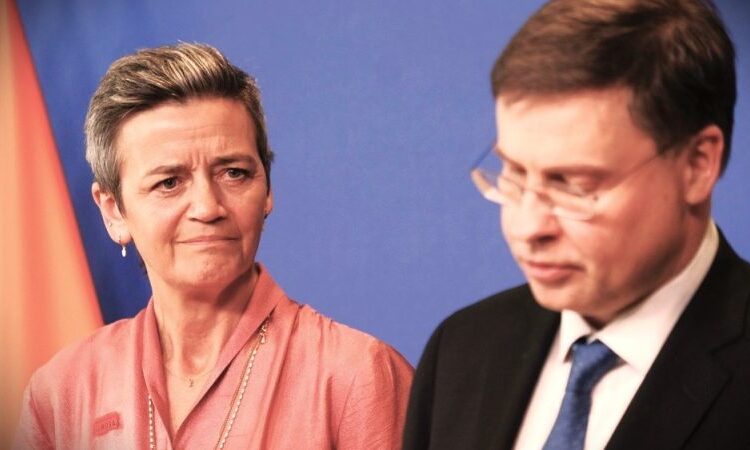
The European Commission played down fears that the EU-US Trade and Technology Council (TTC) could succumb to a Donald Trump presidency as pressure on high-level officials from both sides increased ahead of their meeting in Leuven, Belgium, on Thursday (4 April).
Commission officials tried to stem mounting concerns that looming leadership changes in the US, following the presidential elections in November, may threaten the TTC forum’s survival – noting on Wednesday that “the momentum will continue whatever happens in terms of political leadership”.
“We believe that the EU-US transatlantic relationship is there to stay and has a lot of value added on both sides,” an EU official said. “Regardless of whoever is going to be next year in the White House or in the Berlaymont [Commission headquarters], this strength has to continue to be nurtured and developed.”
The Commission was setting up “a structured internal process to prepare for all possible outcomes from the United States presidential elections,” the official added.
The TTC forum, a brainchild of European Commission President Ursula von der Leyen and US President Joe Biden’s administrations, was created in 2021 to improve transatlantic ties after the Trump presidency.
However, with US polls showing Trump leading in six of the seven swing states ahead of November’s presidential elections, European stakeholders have voiced concerns that this week’s forum – the sixth since its inception – could be the last of its kind, adding uncertainty to the pre-existing scepticism around the TTC’s effectiveness.
“Expectations for the TTC have shrunk dramatically since the negotiation series was set up,” Rebecca Christie, a senior fellow at EU policy think tank Bruegel, told Euractiv.
“This next round will likely be the last one before the EU and US elections, and the talks need to justify their existence.”
Leuven talks will be high time to secure TTC’s future
Amelie Coulet, senior manager at IBM’s government and regulatory affairs in Europe, agreed that there was “a sense the TTC has fallen short of its ambition, bogged down by trade irritants, an unwieldy number of working groups, and a lack of structured stakeholder engagement.”
This meeting will be crucial for institutionalising the forum, particularly ahead of changes stemming from EU and US elections, said Susan Danger, CEO of the American Chamber of Commerce (AmCham) to the EU.
“While we don’t know what is going to happen after the elections, what we do know is that we definitely need the TTC to continue,” she added.
Coulet agreed that “irrespective of how elections play out,” the EU and the US needed to “double down on efforts to reinforce the transatlantic relationship, including fully leveraging the TTC,” she told Euractiv.
The Atlantic Council, an influential US international affairs think tank, similarly stated last week that Thursday’s talks in Leuven, near Brussels, “will be crucial for convincing whoever is in power next year that the TTC is an experiment worth continuing”.
According to Coulet, aggregate US-EU business amounts to a $8.7 trillion-worth “transatlantic economy” that “depends on Brussels and Washington being partners before competitors”.
In a paper published on Wednesday, BusinessEurope, Europe’s largest corporate lobby group, urged policymakers to “redouble efforts to bolster […] ties” this week, and pointed to investment between the two blocs surpassing $5 trillion, with trade in goods and services exceeding $1.2 trillion.
Can the TTC overcome tariffs and IRA pains?
But even the most fervent TTC supporters are aware of the roadblocks that stand in the way of turning it into a more solid blueprint for US-EU policy convergence and concrete trade agreements.
At a time when legislative efforts in both jurisdictions have been re-geared towards shoring up economic security and critical supply chain autonomy, some sore points persist and are poised to test the TTC’s future potential.
AmCham, which has been spearheading efforts to safeguard the forum, published a position paper last week singling out the shortcomings that have limited the TTC impact so far. It highlights how it has failed, for example, to resolve “longstanding trade irritants, such as the tariffs on steel and aluminium”.
“Disputes and irritants should be tackled outside the TTC to avoid hindering other projects within the framework,” AmCham warned, calling on policymakers to remove those barriers as a prerequisite for setting out a joint approach on other pressing issues such as economic security and respective plans for an “open strategic autonomy agenda”.
Overall, however, it’s not only the Trump-era tariffs on European steel and aluminium that continue to strain US-EU trade relations. The trademark economic policy of the Biden era— the 2022 Inflation Reduction Act (IRA) — also puts substantial pressure on several European sectors by creating ‘state-coordinated’ advantages for US counterparts.
An AmCham spokesperson highlighted to Euractiv the launch of a dedicated US-EU IRA task force as a positive step towards tackling the unintended economic consequences of the landmark US measure.
However, a 2023 policy brief by the European Council on Foreign Relations think tank interpreted the same IRA developments as “a new playbook for US-European economic relations established by the Biden administration”, which it dubbed “ex-post coordination”.
Compounding those unbalances, Coulet argued that even within the TTC framework, the US and the EU have maintained “diverging objectives”.
“Both sides have too often looked at issues from a purely domestic perspective without always taking into account the impact of their industrial policies on each other,” she said.
Christie also warned that “Washington and Brussels need to figure out how their security interests” can be aligned given the negative impact IRA facilitations to domestic US production have had on European sectors such, for example, carmakers.
“The current state of policy is likely to lead to a lot of squabbling going forward,” she said.
[Edited by Alice Taylor]







